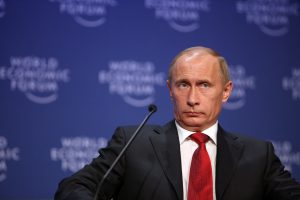Well, no, Mr. Borrell! I am sorry to have to tell you this, but you were mistaken, and were seriously wrong, when you said last week, before the 27 Foreign Ministers of the Union meeting in Zagreb, that: “If you forget your capacities and you only think about your purposes then it’s not political, that’s magic. (…) We want to act according to our capacities and resources and we don’t have the capacity of establishing a no-fly zone in Syria.”
Even though the German Chancellor and the Dutch Foreign Minister, two harum-scarum people, both devoted to magic, publicly declared that they were in favour of this no-fly zone above Idlib, your voice has been heard, unfortunately. So, as usual, we will do nothing, but contrary to what you said, Mr High Representative, politics does not consist of adapting one’s objectives to one’s capabilities, but of adapting one’s capabilities to one’s objectives and, in this case, to essential necessities.
Of course the Union does not have the means to control the Idlib sky.
It does not have them because it still does not have a common Defence but, together or even with a few of them, its Member States have more than enough aircraft to do so. If you had called on them to assume their responsibilities and reminded them, Syrian evidence provided in support, of how much we need common military means to make ourselves heard and to ensure that our interests are respected, you would have moved the debate forward instead of preaching renunciation.
Instead of further discrediting the Union by declaring what it cannot be, you would have shown its citizens that the Union can choose to exist and would have explained why we cannot delay any longer to lay the foundations for a common force and why we must, in the meantime, coordinate our national means, here, immediately, now, whenever necessary, because, at last…
In this region of Idlib, which was the first to take up arms against the Syrian regime, there are more than two million inhabitants to whom 900,000 displaced persons have joined from other regions reconquered by Bashar al-Assad’s army. That is more than three million people who know all too well what would happen to them if they were to fell into the hands of the butcher of Damascus, and that, if they are not protected, they will have no choice but to force their way across the Turkish border.
That is the first point, and the second is that the Turkish President, Recep Tayip Erdogan, does not want to open fire on these unfortunate people any more than he wants to take them in when there are already three and a half million Syrian refugees in his country. Rejection is on the increase among his population because competition is becoming fierce on the labour market. Despite the fact that we Europeans have taken responsibility for financing the infrastructure and the aid required as a result of this tragedy, the situation in Turkey is no longer tenable, and that is why Recep Erdogan has embarked on his blackmail to open the borders with Greece and Bulgaria.
Either, he tells us, you organise the banning of Syrian aviation from the skies over Idlib with me, or you take my refugees while I take out those who strike at my Syrian border.
Is this blackmail unacceptable? Absolutely.
Is this blackmail all the more repugnant because Turkey used its refugees as mere pawns by making them believe that the European borders were open to them? That is also true, and it does not do more credit to the dictator which Mr Erdogan has now become, but are we really more virtuous when we do not lift a finger to help the countries on Europe’s shores, Greece and Italy, and we outrage at the heartlessness of others while at the same time we leave our borders carefully closed?
Perhaps we are right, thirdly, to keep our doors closed before our extreme right-wing extremists gain as much weight everywhere as they do in Germany. That is a perfectly defensible position, but we cannot at the same time refuse refugees, fourthly, and do nothing, leaving them with no choice but to die or to breach the borders, whether Turkish or European.
This is where we come back, Mr Borrell, to your contradiction between magic and politics. Magic is to let people think that we could get away with a few more cheques. Politics is to finally exist, we the Union, to stop relying on the current false agreements concluded between Mr Putin and Mr Erdogan, to coordinate our forces, to ask for logistical support from the Alliance to which we belong: NATO, to prevent any bombing of Idlib and, having got into the game, to work towards a peace agreement involving the cantonisation of Syria and the preservation of the interests of all the powers concerned, including the Union.
How long will it take? Will it be complicated? Will it be risky?
Indeed, but then what are we waiting for and what are you waiting for, Mr High Representative?


